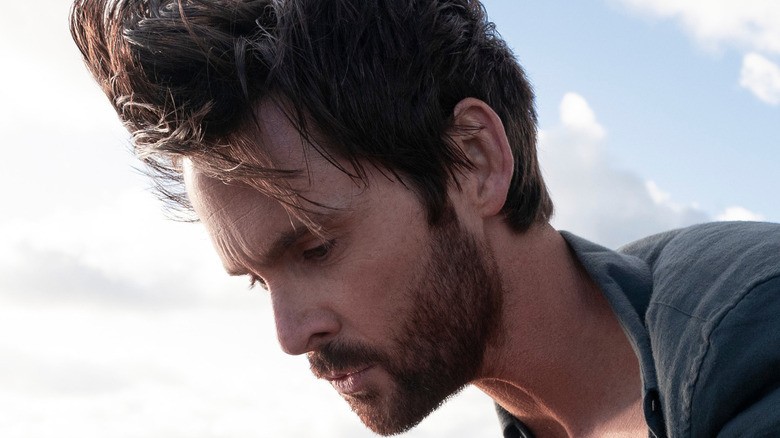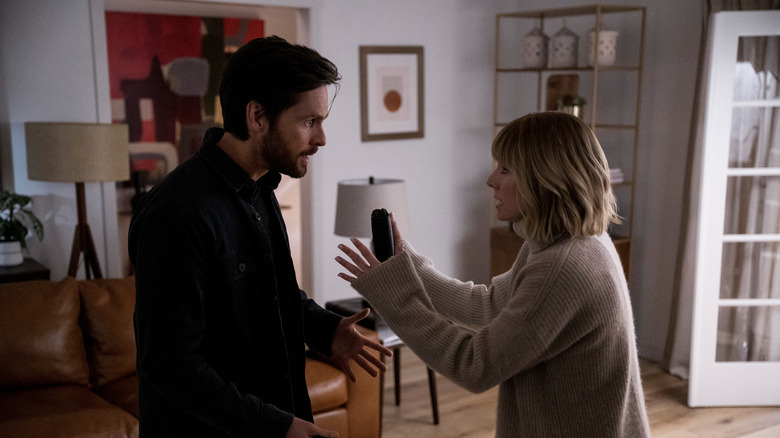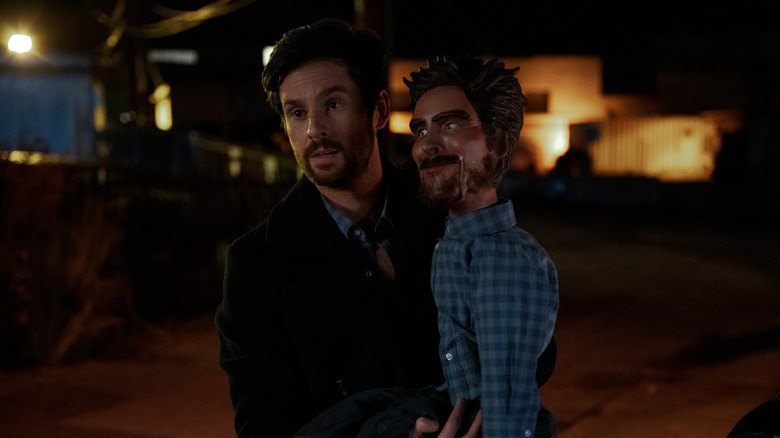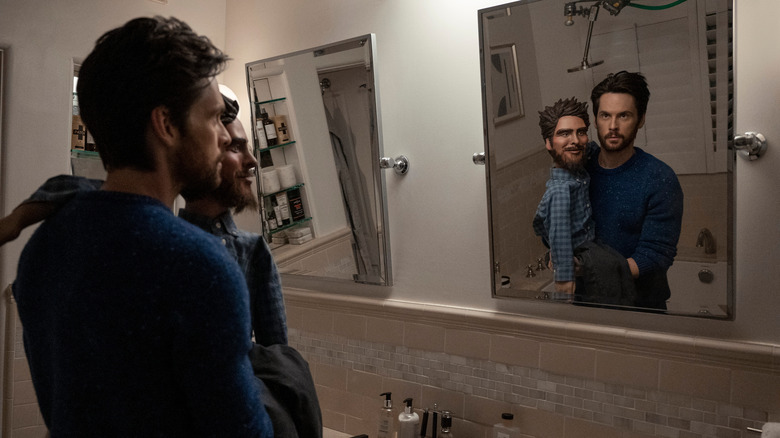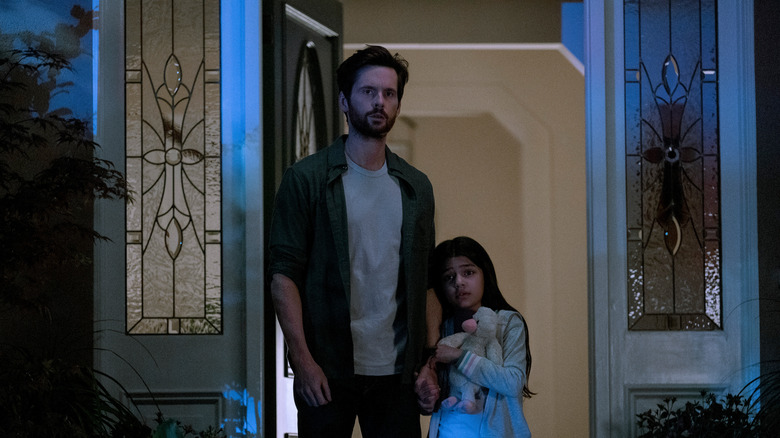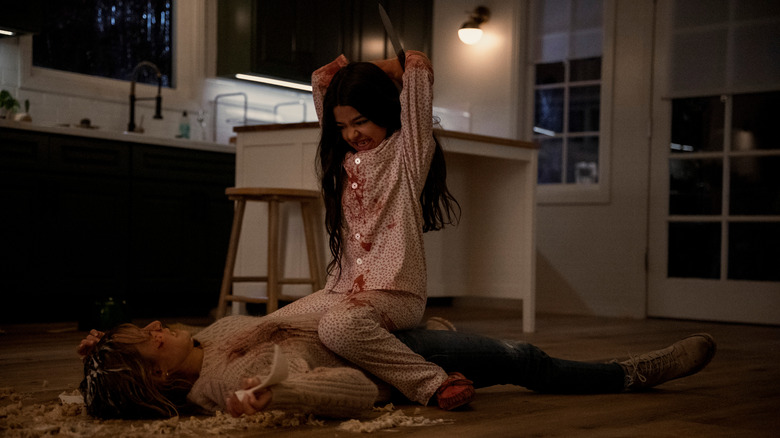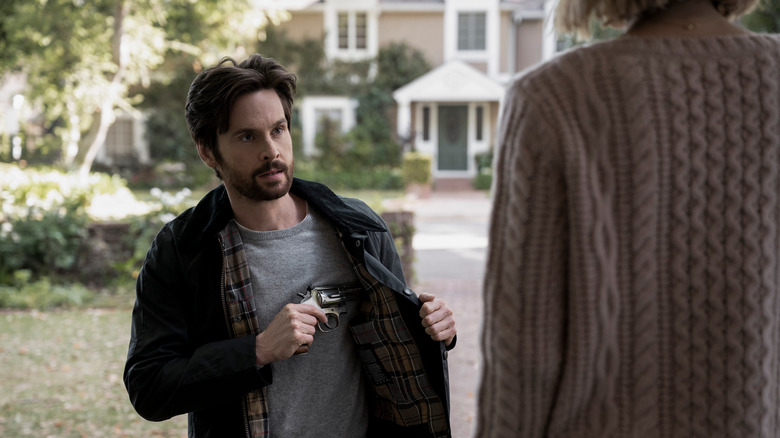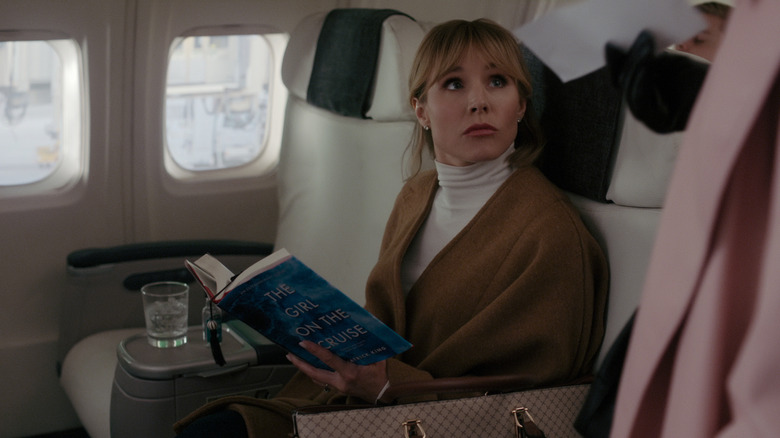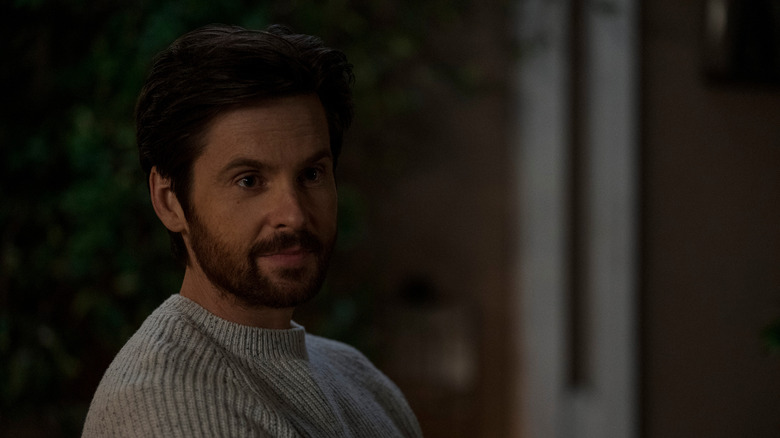Tom Riley On The Ending Of The Woman In The House Across The Street From The Girl In The Window - Exclusive Interview
This interview contains major spoilers for the ending of "The Woman in the House Across the Street from the Girl in the Window."
"The Woman in the House Across the Street from the Girl in the Window" shocked audiences when it dropped with its satirical take on the thriller genre. In fact, the nuances were so expertly done that some fans didn't even realize they were watching a parody. The series boasts a cast with Kristen Bell ("The Good Place") at the helm as Anna, Tom Riley ("The Nevers") as her new neighbor Neil, and Shelley Hennig ("Teen Wolf") as Neil's seemingly put-together flight attendant girlfriend.
What happens when your daughter gets murdered by a cannibalistic serial killer during Take Your Daughter To Work Day, and you numb yourself with thriller novels, wine, and narcotics? Bell dramatically explores that very notion when her character witnesses a murder while stalking her dreamy neighbor — with a few twists along the way.
During an exclusive interview with Looper, Tom Riley opened up about the explosive ending of "The Woman in the House Across the Street from the Girl in the Window," dissected some of the series' most meta moments, and revealed what it was like working with Shelley Hennig and Kristen Bell.
Kristen Bell: Leader of the pack
You have some pretty intense scenes with Kristen Bell. What was it like acting alongside her, and do you have any fun memories with her from on or off set?
It's all fun memories. She's a blast. It was great to work with her, not only because she is so committed to getting the show to the best possible place it can be and doing the best work she can, but she's also just a great hang — on and off set. You never feel the pressure to work to an extent that you're not comfortable with. She generally makes life easier for everyone on set, in front of the camera and behind.
The show is brilliant, and I'm sure that there were plenty of moments to improvise or ad-lib. Was that something that you were encouraged to do, and can you remember anything that either you or anyone else added in the moment?
A lot of shows, they fall into two categories. You've either got the intense showrunners who demand that lines are read exactly as written on the page without any change, or people are a little more chill. A lot of the time, if they're a bit more chill and there is a collaborative process, you sit down, you work out how to make a scene feel better and more truthful, and work in a way that it might not be doing on the set.
With this show, the lines were both bad and were supposed to stay that way. There wasn't as much improv as there could have been because anything that you tried to say to make it sound more natural or anything off the cuff and witty, didn't necessarily fit into the kind of Lifetime-y, clunky style dialogue we were trying to do. There were comedy bits we threw in, that like, for example, in Episode 4, with the ventriloquist dummy, I was doing lots of weird slapsticky stuff with that dummy. It didn't fit the eventual weird tone that we were going for, but as far as lines were concerned, no, we didn't really improv around them.
The meta thrills
Some fans haven't realized that this show is a satirical series that pokes fun at the thriller genre.
Oh, I know.
Why did this kind of project excite you, and what was your favorite meta moment from the show?
When we were shooting this, the writers did say, "We are trying for something [specific] here..." Before it came out, you have to land on how best to describe a show before it's airing. I think we went down the parody comedy route, but [the whole time] we were shooting, the writers were saying that this is a strange tone.
Everything about it is slightly uncomfortable and discomforting to watch because people are so used to being helped down the road that they're supposed to be watching a show — whether it's like, "Oh, the signposts are usually there," whereas this, we were using the signpost from one genre and we needed to keep the audience invested, while at the same time, poking fun at them from another genre, which lends this strange discombobulating viewing experience. That was definitely my take on it. When I read it the first time, I was like, "This is something that I haven't done before, and I don't know if I can pull this stuff," but they were also positive that it would be fun to try, and if nothing else, we'd amuse ourselves. We seemed to have amused other people as well, even if they don't quite know what they're watching.
The reliability of the unreliable narrator trope
Speaking of that sort of confusion, I think the unreliable narrator aspect of this show really adds an intense element to the series because we don't really know if we can trust any of Anna's recollections that pop back and forth between reality and delusion. As one of the show's suspects, how do you think that element enriched the story as a whole and then your particular character arc?
The unreliable narrative is such a trope that has been used in these types of suburban domestic thriller movies when they're being taken seriously, and it's really effective. We used what was most effective about it to our advantage, because some of the things that we wanted to have happen [were] so ridiculous. It allowed us to use the fact that she was unreliable to play in these absurd realms. I'm one of the few people ... Anna's flashes of imagination are very brief apart from how she sees what she thinks I might have been up to, which are full scenes.
Episode 4 begins with what looks [like] what actually happened until you discover it's just her mind. For me, it was a chance to play everything at once, and then fundamentally, the character's just like your Lifetime movie, romantic novel guy that she's putting all this stuff onto and then, at the same time, can be a potential murderer and act out the murders [so that] she actually gets to do the killings. That was a really fun part of the show, to lean into what we could play with on the unreliable narrative front.
You also had some great scenes with Shelley Hennig. What was it like working with her, and do you wish that you got some more scenes together?
I do. I love Shelley. She's a blast. She's got a really anarchic, dark, chaotic sense of humor. I didn't know her before, but I really enjoyed spending time with her. She's incredibly talented. I would've loved to have done more stuff with her.
The wild reveal
How far in advance did you know who the killer was? Did you get scripts episodically, or did you know from the start? And then how did you react to that big reveal?
What was unusual about this one — in comparison to how a longer-running series would be, rather than a limited series — is that we knew everything from the beginning, and what was great is we have one director for the entire show. He was shooting all eight episodes at once. We do stuff from Episode 2 on one day and then stuff from Episode 8 the next day, then stuff from Episode 1 the third day, depending on the locations' availability. We had to know what was ahead. As far as that reveal's concerned, when I was reading [the scripts], it was the closest I got to discovering, by reading all the episodes in a row. It felt simultaneously like the stupidest possible [ending] and the perfect one.
We are building very clearly towards something absurd, and no matter how absurd you think it can get, we go one step further. My favorite thing about the absurd reveal at the end is the fact her motivations are so ... They're just weak. You're like, "Oh, because his ventriloquist act was bad or because she wouldn't give you any money for your cookies." What?! We've led the audience down the garden path of trying to work out what the motivation would be amongst all these deep-thinking adults, and it's just some kid being pissed off. It's good stuff.
What was it like working with Samsara [Leela Yett] as your onscreen daughter, and do you wish that the moment that she turns on you and kills your character happened on screen in flashback after the killer is metaphorically unmasked?
It's funny, watching it the other day, I had that exact thought — not that I wished it happened. That fight is so brilliantly displayed, and it's so brutal, and there is a little bit of a bait and switch for the audience, and Anna says, "Oh, don't leave her alone," assuming it's me. I thought, "God, I would've liked to have had a bit of the fight on my own." She walks into a fight and thinks that I'm attacking her, attacking Samsara. I did think that while watching it. I thought, "God, I don't know when else I'm going to get a chance to have a full-blown smackdown fight with an eight-year-old." Probably never, but she was perfect for the part. She's battled in real life.
Glimpsing the battle
You were lying on a couch for that wild fight scene between Anna and Emma. What was it like having to keep fully still while such an iconic scene was filmed, or was that done with a double? Did you get a chance to watch any of that in real-time when you weren't in the frame?
Anything that went into my field of vision [was] because I made the schoolboy error of deciding to be dead with my eyes open, which seems a really good idea when you're only going for a five minute scene and a terrible idea for a scene that takes a week to shoot.
If any of the fight went through my field of vision, I could see it. Aside from that, because the camera was flipping all over the place and they were jumping all over the place, I was too scared to sit back and watch in case I happened to be in the background of a shot accidentally grinning away and ruining all their hard work ... There's nothing to complain about, it's boring to be sat in one place covered in blood, but I was witnessing something absolutely insane. I don't know if I'll get a chance to do that ever again. It was a blast.
The epilogue of sorts at the end of the series seems to be setting up another season. Do you think this is a one and done series, or is there room for Season 2? Though your character died, Anna has been known on more than a few occasions to see things that aren't there. Would you be willing to come back in some capacity?
I'd 100% come back because I really admire what the writers were doing. I admire how they managed to ... What I find incredible about watching the aftermath of this and being able to do press after it's come out, is being able to say how much they predicted would happen, from [an audience] reception standpoint has [now] happened. It was like, they thought, "Well, this is how this is going to go down, and won't it be fun?" It really did, and I really admire their ability to stick to this — believe in what they were doing and not let the wind knock them off course ... this show that has bewildered people as much as delighted them or angered them, or people finding it the worst thing they've ever seen or best. I'd much rather that than anything middle of the road. Yeah, I'd definitely come back. It was fun. I think Anna can solve mysteries forever, to be honest.
The kids are not alright
The most chilling aspect of the show comes from the fact that Neil doesn't even remotely suspect that his daughter has no concept of morality or the sacredness of human life. How do you think that kind of deception and ability to manipulate emotion plays out in true crime and real-life serial killers?
Well, that's part of the joy of it, isn't it? That's why you are allowed to veer off in plots like this into a place where you're going, "Well, look, if someone doesn't work the way that you and I work, if someone doesn't follow the rules of morality that the rest of civilized society deems to be the correct rules, then they're capable of anything." That allows you to do a wild plot twist. I don't know where they go from here, unless the murderer in the next season is a baby.
In hindsight, it seems all of Emma's stories about Neil's temper were fabricated to fit her innocent narrative, but Anna had a lot of her own theories about who your character is as a person. Do you think that was just spinning her web of delusions for her theories to make sense, or do you think that maybe there's a grain of truth into some of that and Neil does have a darker side?
It was always more interesting to think that he probably did have a dark side, and everyone's got a little something going on in closed doors, that other people are going to interpret their own way in a positive or negative way. What's interesting, watching it properly over the weekend is that, generally, everything that Anna says is made up in her head based on what Emma says, but we also know Emma has an ulterior motive for lying about her father, but the one person who doesn't is his ex-wife's sister. She says, "I didn't trust him." That's the one bit that's like, "Okay, maybe there was something else going on." Maybe there is more to him for Season 2.
Thriller meets sitcom
This show takes a very sitcom approach in terms of episodes being about 25 to 30 minutes each. How do you think this structure helped move the show along and create some urgency rather than being a really slow burn series like so many thrillers tend to be?
You get to the end of the half hour, and it allowed the chance to ... It's an interesting time to be making TV because there is always the argument that something that's clocking in at three-and-a-half hours like this could be a movie. There is something about this sort of ... The nature of the genre is intentionally digestible. They're airport novels for a reason. They go down, and that was part of the thing that we were using to our advantage while also spoofing a little bit. You know that in that half hour, you're going to get a wild cliffhanger, and then the next one's only going to be another half an hour, 20 minutes. That really helps not only accelerate the plot, but it helps keep the writers focused on where they're heading, and it helps keep the audience hooked. It's very different to what it would've been if it was an hour or a movie, I think.
What has been your biggest takeaway from doing this series, and what are you looking to do next on the horizon?
It's interesting. My biggest takeaway is you can never predict, necessarily. It's an interesting time to be making TV or films anyway, because there used to be a period where there wasn't such a deluge of content that would be a little clearer where something was going to be a hit or not. Now, it's very difficult to stand out in this landscape where there's so much stuff all the time on so many different forms. You can get your TV and film everywhere and on any screen from any network, and it used to be a lot clearer what would pop.
Now, it feels far less that you should be trying to make strategic choices and far more that you should be going for the thing that feels different and new and fun. That was definitely the case with this show. It was something that felt original and unpredictable, and I really was looking forward to spending three months with Kristen being silly in Los Angeles and could never predict this is where we would end up. Coming up, the second half of "The Nevers" on HBO, we just finished a couple weeks ago. The second half of the first season of "The Nevers," that will come out at some point this year.
So, what's next?
Is there an actor or director from any time period or the present that you are dying to work with?
I'd go with Jimmy Stewart, but I don't think that's possible. [Then again], anything can happen on this show, so maybe we'll bring him in for Season 2 [with] CGI.
Is there something in the show that you wish you got to do or someone that you wanted to work with that you didn't get a chance to?
I love Cameron Britton's work in this as the handyman. I walked past him a few times because he's always fixing the mailbox for ten years or whatever, but we never got lines together. [We] hung out off set. He's a really good guy and incredibly, so watchable, and I really enjoy watching his work in this. I would've liked to have done stuff with Cameron.
Do you have a favorite movie or show of all time?
Too many. That's a wild question. Does anyone have an answer to that? I don't know what you say to that. When someone asks a question like that, you go to something in your head that you feel you should say, like "Breaking Bad" or something, and you end the interview, and you're like, "Why did I just pick the [most random choice]?" I'm going to say no, I have no favorite.
Is there a franchise that you are dying to break into, something like "Star Wars," Marvel?
[Jokingly] I've never heard of any of them. What are they?
The first season of "The Woman in the House Across the Street from the Girl in the Window" is now streaming on Netflix.
